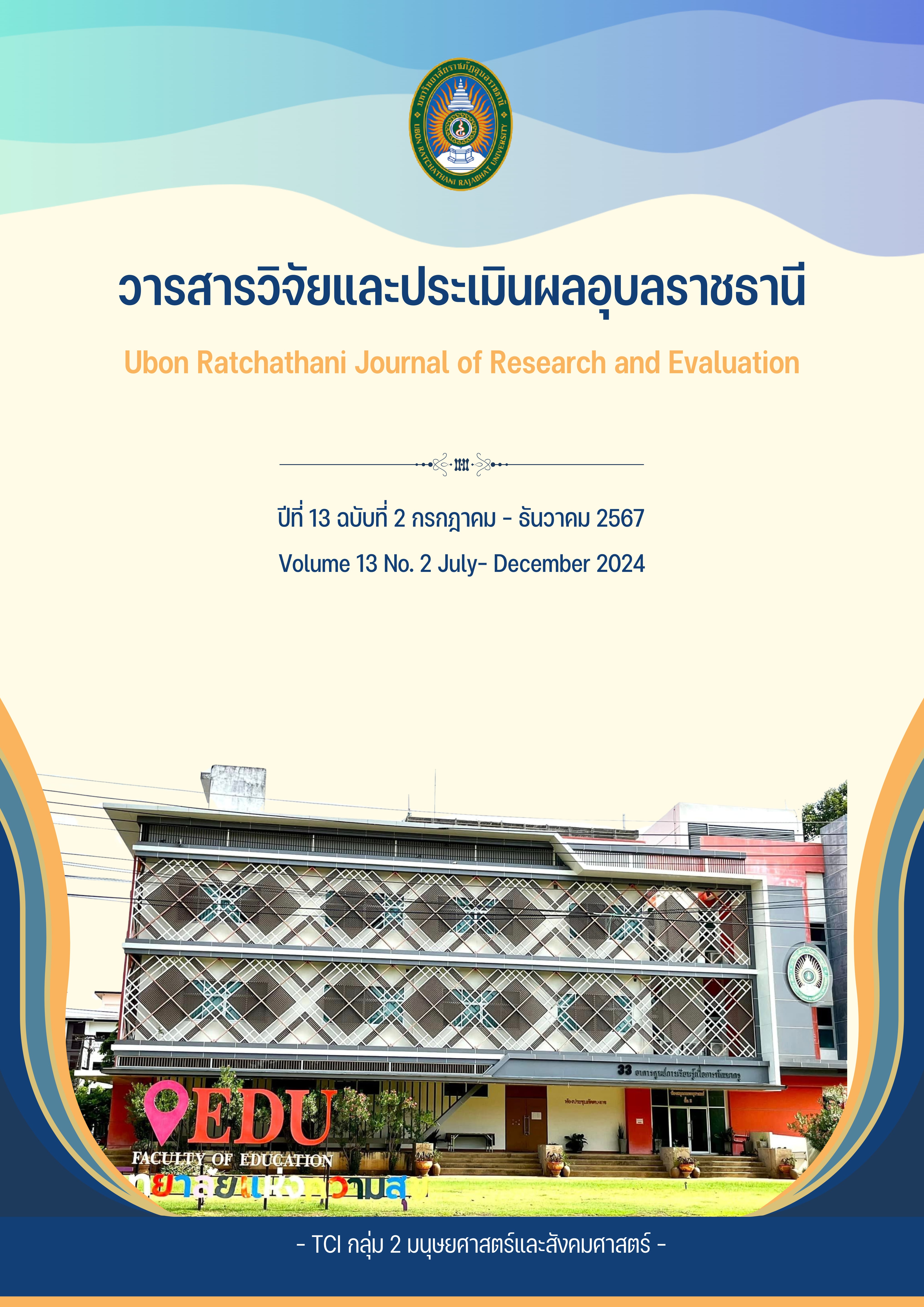The Development of English Speaking Skills in Community Tourism Using Task-Based Learning with Social Media for Undergraduate Students
English Speaking Skills, Task-Based Learning, Social Media
Abstract
This research aimed to study the effectiveness of using task-based learning with social media to the develop the English-speaking skills and English reading comprehension of undergraduate students at Sakon Nakhon Rajabhat University who were studying community tourism, and to compare the English-speaking abilities and reading comprehension of these students before and after the study. The study used Experimental Research, Pre-Experimental Designs, and One Group Pretest - Posttest Design. The samples selected by the purposive sample group were the 50 undergraduate students at Sakon Nakhon Rajabhat University who registered for the 2nd semester of 2021 academic year. The data was analyzed to find the mean, standard deviation, and t-test on dependent variables.
The research findings were as follows:
The efficiency value of the average practice score during study was 84.30 after the study was significantly higher than before the study at .05. The mean post-test score was 89.43 points, which is higher than the specified criteria of 80/80. The average achievement score for English speaking skills for task-oriented communication prior to the study was 12.88, with a standard deviation of 2.93, and after the study 33.72, with a standard deviation of 2.33, from a full score of 40 points. It can be concluded that students successfully developed English speaking skills and English reading comprehension in the community tourism context by using task-based learning with social media.
References
เอกสารอ้างอิง
กระทรวงการท่องเที่ยวและกีฬา. (2554). แผนพัฒนาการท่องเที่ยวแห่งชาติพ.ศ. 2555-2559. กระทรวงการ
ท่องเที่ยวและกีฬา
การท่องเที่ยวและกีฬา,กระทรวง. ยุทธศาสตร์การท่องเที่ยวและกีฬา ฉบับที่ 4 (2560-2564). กรุงเทพฯ :
สำนักงานปลัดกระทรวงการท่องเที่ยวและกีฬา, 2560
กอบกาญจน์ วงศ์วิสิทธิ์ . (2551). ทักษะภาษาเพื่อการสื่อสาร. กรุงเทพฯ : โอเดียนสโตร์.
กฤษณา พงษ์วาปี. (2550). การศึกษาความสามารถในการอ่าน และเขียนภาษาไทย และทักษะการทำงานร่วมกันของ
นักเรียนชั้นประถมศึกษาปีที่ 3 โดยรูปแบบการสอน CIRC. วิทยานิพนธ์ครุศาสตรมหาบัณฑิต, สาขาวิชาหลักสูตร
และการสอน, มหาวิทยาลัยราชภัฏนครราชสีมา.
เขมณัฏฐ์มิ่งศิริธรรม. (2556).Social Mediaสื่อสร้างสรรค์เพื่อการศึกษา. Veridian E-Journal, 6(1), 72-81.
ช่อทิพย์ วิริยะ. (2555). การเพิ่มความสามารถในการใช้ภาษาอังกฤษโดยการสอนภาษาแบบเน้นภาระงานเป็น
หลัก: เตรียมความพร้อมของนักศึกษาธรรมศาสตร์ให้พร้อมเข้าสู่ประชาคมเศรษฐกิจอาเซียน. ค้นเมื่อ
มีนาคม 2559, จาก http://164.115.22.25/ojs222/index.php/tuj/article/view/202/197
ทิศนา แขมมณี. (2550). ศาสตร์การสอน: องค์ความรู้เพื่อการจัดกระบวนการการเรียนรู้ที่มีประสิทธิภาพ.
กรุงเทพฯ: จุฬาลงกรณ์มหาวิทยาลัย.
ธนกานต์ สมหมาย. (2564). การพัฒนาทักษะการอ่านภาษาอังกฤษเพื่อความเข้าใจ ร่วมกับใช้เทคนิคการสอนแบบเพื่อน
คู่คิด สำหรับนักเรียนชั้นมัธยมศึกษาปีที่ 2. การศึกษาค้นคว้า ด้วยตนเอง กศ.ม., มหาวิทยาลัยนเรศวร, พิษณุโลก.
ธีรพงษ์ สุภักดี. (2550). การบริหารการเปลี่ยนแปลงในศตวรรษที่ 21. กรุงเทพฯ: มิตรสยามการพิมพ์
แสงระวี ดอนแก้วบัว. (2558). ภาษาศาสตร์สำหรับครูสอนภาษาอังกฤษ.กรุงเทพฯ : สำนักพิมพ์ แห่งจุฬาลงกรณ์
มหาวิทยาลัย.
รัชณีย์ ธนะวดี. (2544). การจัดกิจกรรมการเรียนแบบบูรณาการโดยใช้สิ่งแวดล้อมส าหรับนักเรียน โรงเรียนวัดสวนดอก.
วิทยานิพนธ์ศึกษาศาสตรมหาบัณฑิต บัณฑิตวิทยาลัย มหาวิทยาลัยเชียงใหม่.
สภาอุตสาหกรรมท่องเที่ยวแห่งประเทศไทย.(2553). เกี่ยวกับสภาฯ.ค้นเมื่อ 20 สิงหาคม 2553. จาก
http://www.thailandtourismcouncil.org/th/about.php
สำนักงานเลขาธิการสภาการศึกษา. (2560). แผนการศึกษาแห่งชาติ พ.ศ. 2560 – 2579. กรุงเทพมหานคร: พริกหวาน
กราฟฟิค จำกัด.
ออมสิน จตุพร, & แสงแข คงห้วยรอบ. (2557). การสอนภาษาอังกฤษในฐานะภาษาต่างประเทศ: ความท้าทาย
สำหรับครูผู้สอนภาษาอังกฤษชาวไทยในศตวรรษที่ 21. วารสารครุศาสตร์ 42 (4)
อาร์จนา ปานกาญจโนภาส. (2558). ภาษาอังกฤษ ภาษาสากลของโลก. เข้าถึงจาก
http://www.forbesthailand.com/commentaries-detail.php?did=351 สืบค้นเมื่อ 23 มีนาคม 2558
British Council. (1995). English in the World: The English 2000 global consultation, Manchester: British
Council.
Endzone. (2014). การพัฒนาการศึกษาภาษาอังกฤษกับอนาคตของไทยในอาเซียน Available from
http://www.dilbilimarastirmalari.com/page/2/ Retrieved August 28, 2014
Johnson, D. W.; Johnson, R.T. and Smith, K. A. (1991). “Cooperative Learning Increasing College
Faculty Instructional Productivity”, Higher Educational Report No.4. Washington D.C.: The
George Washington University.
Krashen,S. (1981). Sceond Language Acquisition And Second Language Learning. Pergamon Press.
Krashen, Stephen D. and Tracy D. Terrell. (1983). The natural approach: Language acquisition in the
classroom. Hayward, CA: Alemany Press.
McCombs, M. E. & Becker, L. B. (1979). Using mass communication theory. New York: Prentice-
Hall.
Randolph, T.L. (2001). Using Folktales to Promote Fluency Among ELF Students in China. TESOL
Journal, 10(1):9-12
Willis, J. (1996). A Framework for Task-Based Learning. Edinburg: Longman.
Downloads
Published
How to Cite
Issue
Section
License
Copyright (c) 2024 Ubon Ratchathani Journal of Research and Evaluation

This work is licensed under a Creative Commons Attribution-NonCommercial-NoDerivatives 4.0 International License.
1. บทความที่ตีพิมพ์ในวารสารนี้ได้มีการตรวจสอบการลอกเลียนงานวรรณกรรมแล้ว ไม่เกินร้อยละ 25
2. บทความที่ตีพิมพ์ในวารสารนี้เป็นข้อคิดเห็น ข้อค้นพบของผู้เขียนบทความ โดยผู้เขียนบทความต้องเป็นผู้รับผิดชอบต่อผลทางกฎหมายใด ๆ ที่อาจเกิดขึ้นจากบทความนั้น ๆ
3. บทความ ข้อมูล เนื้อหา รูปภาพ ฯลฯ ที่ได้รับการตีพิมพ์ในวารสารวิจัยและประเมินผลอุบลราชธานี ถือเป็นลิขสิทธิ์ของวารสารวิจัยและประเมินผลอุบลราชธานี หากบุคคลหรือหน่วยงานใดต้องการนำทั้งหมดไปเผยแพร่ต่อหรือเพื่อกระทำการใดๆ จะต้องได้รับอนุญาตเป็นลายลักษณ์อักษรจากวารสารวิจัยและประเมินผลอุบลราชธานีก่อนเท่านั้น และจะต้องมีการอ้างอิงวารสารวิจัยและประเมินผลอุบลราชธานี ฉบับนั้น ๆ ด้วย






